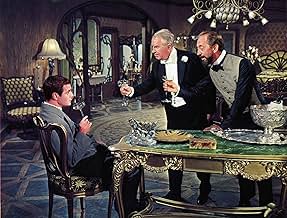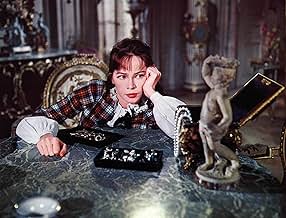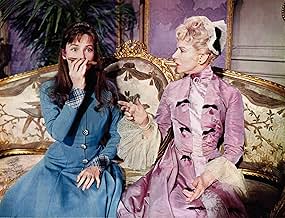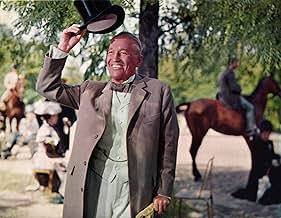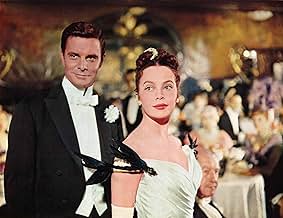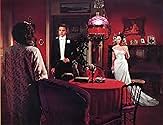Gigi
- 1958
- Tous publics
- 1h 55min
Lassés des conventions de la société parisienne, un riche playboy et une jeune courtisane en devenir jouissent d'une amitié platonique qui ne le restera peut-être pas longtemps.Lassés des conventions de la société parisienne, un riche playboy et une jeune courtisane en devenir jouissent d'une amitié platonique qui ne le restera peut-être pas longtemps.Lassés des conventions de la société parisienne, un riche playboy et une jeune courtisane en devenir jouissent d'une amitié platonique qui ne le restera peut-être pas longtemps.
- Réalisation
- Scénario
- Casting principal
- Récompensé par 9 Oscars
- 22 victoires et 9 nominations au total
- Girl at Maxim's
- (non crédité)
- Waiter at "Palais de Glace"
- (non crédité)
- A boy at Jardins des Tuileries
- (non crédité)
- Harlequin
- (non crédité)
- Gentleman in Park
- (non crédité)
- Maitre d'Hotel Maxim's
- (non crédité)
- Showgirl
- (non crédité)
- Restaurant Patron
- (non crédité)
- Gaston's Private Secretary
- (non crédité)
- Girl on Horseback at Pré Catelan
- (non crédité)
Avis à la une
But let's face it, this is Americanized Collette. She celebrated the deals and compromises within a sexist order that allowed a lucky few high-class prostitutes to become well-to-do, independent women in fin-de-siecle Paris (and a lot of others to at least make some kind of living). She empowered women, at a time when there just weren't many other opportunities for them to establish real independence (our current categories of PC and non-PC wouldn't have meant much then). It wasn't always pretty, but there was reality in her writing about relations between the sexes that hasn't lost its relevance.
Of course, this had to be soft-pedalled for the American audience - hence the ending, which conforms nicely with middle-class morality on this side of the Atlantic. This is the only "politically" unsatisfactory thing about the movie, however. And it remains superior - both "politically" and as a film - to My Fair Lady, where Eliza is implied to return and submit herself to Rex Harrison at the end, whereas Gigi at least implies that it's Gaston rather than Gigi who is going to have to change his ways.
My only other gripe: Why no dancing from Leslie - and from Vincente Minelli, that peerless director of dance sequences? I guess Lerner and Lowe must have been more in control of this one, and weren't of a mind for rug-cutting. Too bad - there really isn't nearly enough of Leslie dancing on film as it is!
The three principals, Leslie Caron, Louis Jourdan, and Maurice Chevalier, along with the Paris locales helps maintain a distinctively French flavor, especially in the way the characters relate and interact.
For everyone who has commented on the political incorrectness of the story, a closer look will actually reveal the true feminist perspective of Colette's work which was groundbreaking for its time: 1) the story is a commentary and observation of the limited social and economic options for women outside of marriage during the turn of the century Paris, 2) Although Gigi (Caron) never fully masters her lessons and grooming, she is able to capture Gaston's (Jourdan) heart precisely because of her imperfections, and 3) most importantly, it is Gaston rather than Gigi who is forced to truly transform himself and defy the social conventions of the time to bring the story to its resolution.
Compare this to My Fair Lady, which offers similar social commentary but resolves itself in a more standard way: For example 1) Eliza Dolittle only becomes noticeable and lovable after transforming her outward appearance and speech patterns 2) Although Professor Higgins finally realizes his love for Eliza at the end, it is Eliza who is forced to submit her will by effecting a reconciliation that does nothing to resolve any of the issues raised in the scenes leading up to that point.
Definitely see Gigi and judge for yourself. (By the way, the widescreen version is sooooo much better. This is especially apparent in numbers such as "I Remember It Well" where entire characters are forced to be cut out of the screen.)
This is essentially a movie about a young girl pushed into sex work by her family of sex workers. She does not, at first, understand that's what's happening, but when she figures it out she's not happy about it. And I just don't see how that can be alright. It would be one thing if this were a commentary on a time when most women's only real path to power and fortune was through sex, but that's not what this is. This is a light frothy musical about something really bad.
And it's a shame, because it's full of great songs. Ignoring the sleaziness, Thank Heaven for Little Girls is charming. The Night they Invented Champaign is a fun, amusing number, as is I Remember it Well.
The performances are excellent, particularly Leslie Caron as Gigi. But I can't even watch this movie because I find it so creepy. Gigi's situation is heartbreaking, and while yes, it's a 50s musical that resolves everything pleasantly, Gigi is powerless in the equation.
As a youth I was horrified by a movie about someone my age who's agency had been taken away by "well meaning" relatives. As an adult I find it even more disturbing.
And yeah, a lot of people are just going to say I'm a buzzkill and it's just light froth. But I can't see it that way.
Herimone Gingold is wonderful as Grandma and Jourdan is terribly handsome and suave as Gaston. Even a Gabor, the more talented Eva shines in this because there simply is not a bad moment, as for Jaques Bergerac (Mr Ginger Rogers) his role may be small, but he sure is handsome.
The score is 100 percent, The parisians is my personal favourite number, the title number is beautiful, thank heavens for little girls has become a standard, she is not thinking of me is a knockout and the night they invented champagne is wonderful, my only regret? So little dancing for the greatly talented Miss Caron.
Oscars Best Picture Winners, Ranked
Oscars Best Picture Winners, Ranked
Le saviez-vous
- AnecdotesWhen Alan Jay Lerner met Leslie Caron in London to discuss the film with her, he was surprised to discover that Caron, who was of French birth, had become so immersed in the English culture that she had lost her French accent.
- GaffesDuring Gaston's song by the pond thinking of Gigi, there is a fence in the pond forcing the swans to stay in close background. The swans, obviously confused yet undeterred, keep swimming into the fence attempting to get to the swan in deep background on the other side of the pond.
- Citations
Aunt Alicia: Love, my dear Gigi, is a thing of beauty like a work of art, and like a work of art it is created by artists. The greater the artist the greater the art. And what makes an artist?
Gigi: Cigars and jewelry?
Aunt Alicia: Gigi, you're from another planet.
- Versions alternativesIn some prints shown on television, we see still photos of Leslie Caron part of the time during the song "Gigi", instead of seeing Louis Jourdan singing. (This occurs after the verse and first chorus, when the orchestra plays the song while Jourdan only exclaims "Gigi!") As shown currently, we see Jourdan singing throughout the whole song, as in the theatrical release.
- ConnexionsEdited into Histoire(s) du cinéma: Une histoire seule (1989)
- Bandes originalesThank Heaven for Little Girls
(uncredited)
Lyrics by Alan Jay Lerner
Music by Frederick Loewe
Performed by Maurice Chevalier
Meilleurs choix
Détails
- Date de sortie
- Pays d’origine
- Langues
- Aussi connu sous le nom de
- The Parisians
- Lieux de tournage
- Société de production
- Voir plus de crédits d'entreprise sur IMDbPro
Box-office
- Budget
- 3 319 355 $US (estimé)
- Durée1 heure 55 minutes
- Couleur
- Mixage
- Rapport de forme
- 2.35 : 1
Contribuer à cette page



